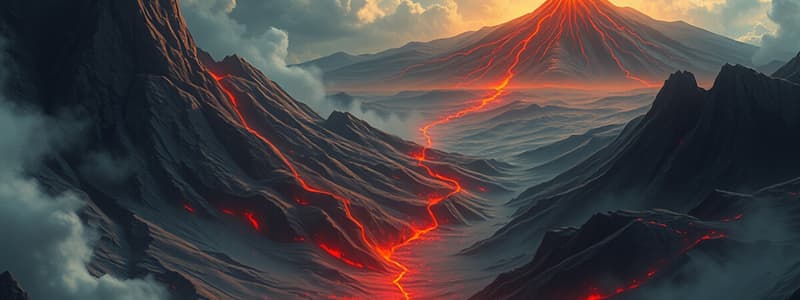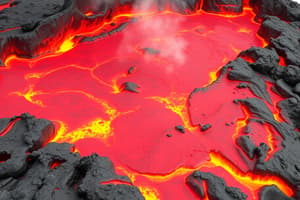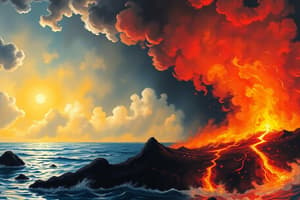Podcast
Questions and Answers
Which of the following volcanoes is associated with the Ring of Fire?
Which of the following volcanoes is associated with the Ring of Fire?
- Mount St Helens
- Mt. Pinatubo (correct)
- Mauna Loa
- Kilauea
How did the ridges around Shiprock form?
How did the ridges around Shiprock form?
They are old dikes radiating from the main neck of the volcano.
What geologic event led to the formation of the rocks that make up Shiprock?
What geologic event led to the formation of the rocks that make up Shiprock?
The rocks in Shiprock formed when magma solidified in the neck of an old volcano.
How did erosion affect Shiprock?
How did erosion affect Shiprock?
The composition of the rocks that make up Shiprock would most likely be similar to which of the following rocks?
The composition of the rocks that make up Shiprock would most likely be similar to which of the following rocks?
Which of the following objects has a size similar to that of lapilli?
Which of the following objects has a size similar to that of lapilli?
Volcanic ash is best described as which of the following?
Volcanic ash is best described as which of the following?
Which of the following volcanic materials flows out of a volcanic vent?
Which of the following volcanic materials flows out of a volcanic vent?
What is the volcanic feature in which magma rises through before it is released at the surface?
What is the volcanic feature in which magma rises through before it is released at the surface?
How do flood basalts form?
How do flood basalts form?
Which of the following islands is the oldest in the Hawaiian chain?
Which of the following islands is the oldest in the Hawaiian chain?
From where do scientists think that mantle plumes originate?
From where do scientists think that mantle plumes originate?
Hot spots are best described as which of the following?
Hot spots are best described as which of the following?
Which scenario best describes how the Hawaiian Islands formed?
Which scenario best describes how the Hawaiian Islands formed?
Which materials in Hawaii's lava help to keep it fluid for longer at the surface?
Which materials in Hawaii's lava help to keep it fluid for longer at the surface?
Which of Hawaii's five volcanoes are still considered to be active?
Which of Hawaii's five volcanoes are still considered to be active?
What has the single most immediate effect on lava's ability to solidify?
What has the single most immediate effect on lava's ability to solidify?
In what direction was the tectonic plate moving toward based on the ages of the volcanic islands?
In what direction was the tectonic plate moving toward based on the ages of the volcanic islands?
At what tectonic setting is Hawaii located?
At what tectonic setting is Hawaii located?
What drives melting at divergent boundaries?
What drives melting at divergent boundaries?
Which of the following tectonic settings does NOT produce volcanism?
Which of the following tectonic settings does NOT produce volcanism?
Volcanologists classify volcanic landforms into three major types: shield volcanoes, cinder cones, and composite cones. Fill in the missing types.
Volcanologists classify volcanic landforms into three major types: shield volcanoes, cinder cones, and composite cones. Fill in the missing types.
Match the following types of volcanoes with their descriptions:
Match the following types of volcanoes with their descriptions:
Classify the following real-world volcanoes:
Classify the following real-world volcanoes:
Which feature at Yellowstone National Park is evidence for a magma chamber beneath the park?
Which feature at Yellowstone National Park is evidence for a magma chamber beneath the park?
Flashcards are hidden until you start studying
Study Notes
Volcanoes and Volcanic Features
- Mt. Pinatubo is part of the Ring of Fire, a zone with significant volcanic activity.
- Shiprock's ridges are formed by old dikes radiating from its volcanic neck.
- The rocks of Shiprock originated from magma that solidified in an ancient volcano's neck.
- Erosion has removed much of the lava, pyroclastic material, and parts of Shiprock's volcanic neck.
Volcanic Materials and Measurements
- Shiprock's rock composition is similar to igneous rocks found in continental volcanic activity.
- Lapilli, volcanic fragments, are roughly the size of a marble (15 mm).
- Volcanic ash consists of microscopic rock pieces expelled during eruptions.
- Lava is the molten material that flows out from a volcanic vent.
Volcanic Structures and Processes
- A conduit is the feature through which magma ascends to the surface.
- Flood basalts result from eruptions occurring above a mantle plume.
- Kilauea, located on Hawaii's Big Island, is currently erupting; Kaua'i is the oldest of the Hawaiian islands.
- Mantle plumes are believed to originate from shallow mantle locations and the outer core-mantle boundary.
Hot Spots and Formation of Islands
- Hot spots are localized volcanic regions not directly associated with tectonic plate boundaries.
- The Hawaiian Islands were formed when magma from a hot spot breached the overlying plate.
- Temperature significantly impacts the solidification process of lava.
Tectonic Settings and Melting Processes
- Hawaii is situated at an oceanic hot spot, indicating volcanic activity above a mantle plume.
- Decompression melting is the primary melting driver at divergent boundaries.
- Transform boundaries do not produce volcanic activity.
Types of Volcanoes
- Volcanic landforms are categorized into three main types:
- Composite volcanoes (steep with alternating lava and pyroclastic material)
- Shield volcanoes (broad slopes with extensive lava flows)
- Cinder cones (characterized by steep sides and a central crater)
Examples of Real-World Volcanoes
- Notable shield volcano: Mauna Loa, Hawaii
- Prominent composite cones: Mount St. Helens (Washington), Fujiyama (Japan), Cotopaxi (Ecuador)
- Example of cinder cone volcanoes: San Francisco Peaks (Arizona), Paricutin (Mexico)
Yellowstone National Park
- Evidence of a magma chamber beneath Yellowstone includes the ground rising near the Yellowstone River.
Studying That Suits You
Use AI to generate personalized quizzes and flashcards to suit your learning preferences.




